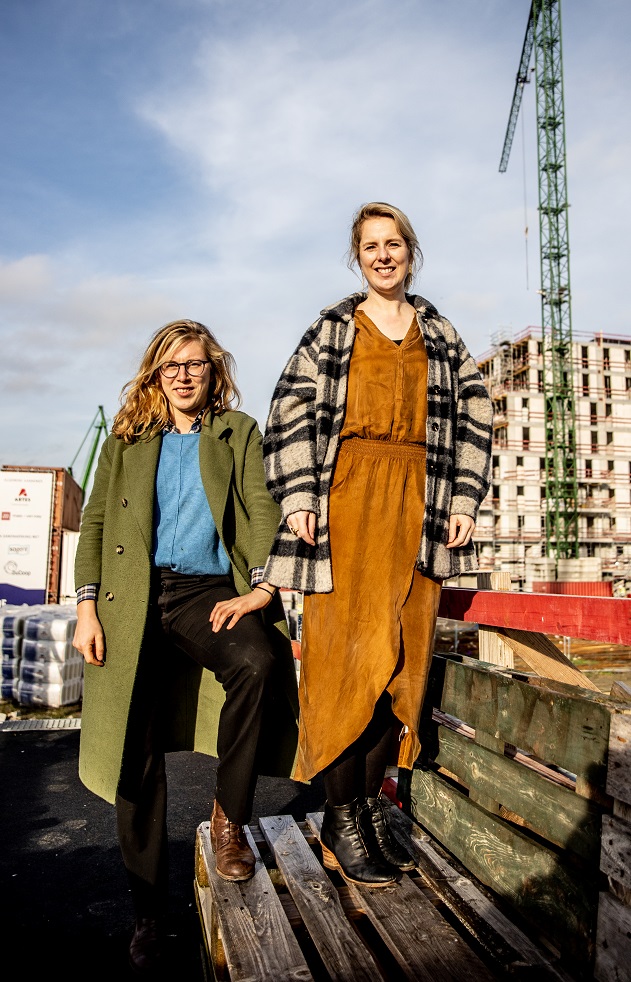Schipperskaai Development, a client of Roof Food as a consulting firm.
Roof Food’s consultancy section is growing by the day. Increasingly more building promoters, authorities and organisations with plans for an urban agriculture project are knocking on Roof Food’s door for advice and support. One example is the development of a vegetable garden in the courtyard of the future ‘De Nieuwe Dokken’ district in Ghent.
In the Ghent port area, between Dampoort and Muide, a new residential district is rising, and what an amazing district it is! ‘De Nieuwe Dokken’ will be Belgium’s first circular residential district with closed cycles for water, waste and energy. The Schipperskaai Development consortium won the City of Ghent’s PPP competition in 2013 and is now taking on this ambitious urban development project.
An obvious choice
 Wendy Wambacq, project team member at De Nieuwe Dokken with a personal interest in (urban) agriculture: “The new neighbourhood will offer space for 400 houses and apartments, offices, a local store, school, sports hall and a collective vegetable garden. As a project developer, we had very little experience with planting vegetable gardens. During our search for a consultancy firm specialised in urban farming, we soon ended up at Roof Food. After seeing what Sabien had created and learnt since her start and the fact that Roof Food is anchored in Ghent, it was an obvious decision for us to choose Roof Food to help with our project.”
Wendy Wambacq, project team member at De Nieuwe Dokken with a personal interest in (urban) agriculture: “The new neighbourhood will offer space for 400 houses and apartments, offices, a local store, school, sports hall and a collective vegetable garden. As a project developer, we had very little experience with planting vegetable gardens. During our search for a consultancy firm specialised in urban farming, we soon ended up at Roof Food. After seeing what Sabien had created and learnt since her start and the fact that Roof Food is anchored in Ghent, it was an obvious decision for us to choose Roof Food to help with our project.”
Challenging project
Sabien: “The first conversation with the people of Schipperskaai Development (CAAAP and Van Roey Vastgoed) was very pleasant and worthwhile. We were immediately on the same wavelength and there was a great mutual willingness to work together. We explored different avenues that led us to a vegetable garden concept that was perfectly suited to this project. It is actually quite a challenging project. In the courtyard of the Noordveld building complex, there will be a vegetable garden of 500 square metres. That is both big while not being too big. Moreover, the garden will naturally be accessible to the 80 or so families who will be living around it, and also to other local residents and passers-by.”
Social sustainability
Wendy: “That’s right. The Nieuwe Dokken project is all about sustainability. Energy consumption will be extremely low, Carbon dioxide emissions will be reduced by 70% and even waste will be given a new life. The Nieuwe Dokken will also be a fossil-free neighbourhood. The water will be recovered and purified locally. Apart from all the innovative techniques needed to create a circular residential area, we also want to focus strongly on social sustainability, and this is where the vegetable garden comes into play. We want to create an informal meeting place with the vegetable garden to strengthen the social interactions between the residents in the neighbourhood. We believe that gardening together is a suitable activity for that and, of course, the fresh vegetables and fruits that the residents will harvest are also going to be a nice bonus.”
Sabien: “The design of the vegetable garden is not yet completely finished. It is our intention to involve the future residents and all interested parties. The ultimate goal is that the neighbourhood itself will maintain the vegetable garden, as giving people ownership greatly increases the chance of success.”
Sustainability Charter
Wendy: “We have a good eye for the sustainability issue. For many people who buy a house or an apartment here, the sustainability aspect is of decisive importance. When they buy, they sign the sustainability charter of De Nieuwe Dokken and residents of Noordveld automatically receive a share in the collective vegetable garden. Of course, everyone decides for themselves what role they want to take in the vegetable garden. However, the idea is that the garden will be planted by the residents themselves.”
Sabien: “We are planning to start construction in the course of 2022. In the first year after completion, we will provide aftercare with Roof Food. This means that we will manage the project. For those who are interested, we will organise some workshops on different aspects of urban agriculture. If you look at how so many people are currently feeling, mostly as a result of the corona pandemic, the opportunity for finding inner peace in nature and growing closer to your neighbours has already convinced me that this project will be a success.”
This story was created with the support of Circular Flanders, the Flemish policy-making organisation for a circular economy.


Leave a reply